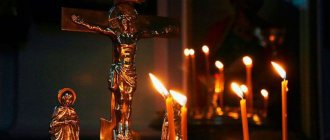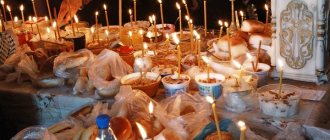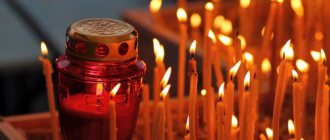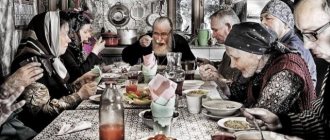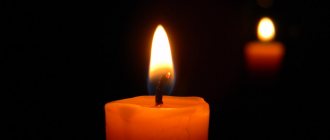The pain of loss, deep grief, confusion and a lot of worries - all these are accompanying factors when losing a loved one. And ritual concerns do not end immediately after the funeral, since the soul of the deceased needs the support and prayer of relatives. You can get maximum help in organizing a funeral and in subsequent memorable days at the Eden funeral agency, in Dnepr, where real professionals work, ready to take some of the burdensome worries off your shoulders.
Soul after death
Many people are interested in scientific data , where the soul goes from a scientific point of view actually ends up after death . Whatever the truth, the Orthodox tradition of marking 40 days after death is so strong that both atheists and non-believers will hold commemorations exactly 40 days after death. Today this is already a folk and secular custom , based on the Orthodox canons about the soul .
What happens to a person's soul after death?
What happens to the soul on the 3rd, 9th and 40th day after death? According to Orthodox beliefs, the posthumous fate of the soul depends not only on its earthly deeds, but also on the prayers offered to the Lord for the deceased. The soul does not immediately go to hell or heaven.
“Three days in the house, up to nine days in the yard, up to forty days on the ground”.
This is what this popular belief reflects:
Soul after death 3, 9, 40 days
- For the first three days after death, the soul hovers near its body or home .
- On the 3rd day after death, the Guardian Angel accompanies the soul to heaven and shows it the tabernacles of paradise .
- On the 9th day, an Angel will escort her to the throne, where she appears before the Lord .
- From the 9th to the 40th day the soul goes through trials and ordeals . Until day 40, a person understands what hell is, life without God .
- On the 40th day, the soul appears before the Lord , where he makes his verdict - to send it to heaven or hell.
The article “What happens to the soul in the first 40 days after death?” on the website “Sodolenovaniye.ru” reveals in more detail why wakes are held for 9 and 40 days.
40 days: on earth, paradise, ordeal, judgment
What happens to the soul during these three days from an esoteric point of view
According to esotericism, the body is not only biological tissue. He also has shells of consciousness. This is confirmed by the manifestation of visible energy bodies, which during a person’s lifetime remain hidden from human vision. They are seen as ghosts. This shell leaves the physical body on the third day after death. Until this happens, the deceased’s feelings do not change - he sees himself alive, but does not understand why he remains unnoticed by anyone. Such changes are difficult to accept, especially if the death occurs suddenly.
The exit of the soul from the physical shell
What should relatives absolutely not do these days?
It is forbidden to lament or howl. Loud exclamations, deep grief of loved ones over the death of the deceased - this aggravates the state of mind of the deceased. You should also not eat meat at a funeral, since the deceased may be reborn in the next life in the body of an animal.
ALCOHOL IS ALSO FORBIDDEN, DRINKING ALCOHOL BEVERAGES WORSENES THE STATE OF MIND.
Funeral dish
How can relatives help you find peace in your soul?
It is necessary to try to accept the will of God and explain to the deceased what is happening to him. The soul hears and perceives everything at the energetic level. You should read prayers and ask for forgiveness for the sins of the deceased.
THE WORD HAS POWER, ESPECIALLY IF IT IS SPEAKED BY A BELIEVER.
Reading prayers
Rituals, customs
After the funeral is over, the soul also needs the support of loved ones. The main customs that contribute to this:
- it is recommended to visit the grave the day after the burial;
- the clothes of the deceased cannot be distributed until 40 days have passed;
- It is recommended to distribute sweets, pies, money in the first days after the funeral, and also every memorable date: the birthday of the deceased, the date of death.
Almsgiving
When a funeral service is not possible
A memorial service is not always held:
- the deceased is not baptized;
- a person has renounced faith (baptized);
- accepted death by killing himself;
- the deceased performed occult rituals during his lifetime;
- atheist;
- unbaptized babies, unborn due to abortion, miscarriage.
WHEN THE DECEASED HAD NOT BEEN BAPTIZED OR WAS NOT A BELIEVER DURING LIFE, HIM CANNOT BE INCLUDED IN THE NOTE OF RESTAL.
Soul of a Suicide
How to count 40 days
For a whole block of popular questions:
How to count 40 days after a funeral How to count 40 days for a deceased person Calculate 40 days from the date of death using an online calculator
The answer is provided by
the online funeral calculator
Funeral date calculator
Enter the date of death on the calculator and click “Calculate”. Below will appear a list of dates with the days of the week when it is customary to hold Orthodox funerals .
- ☦ 3 days . Usually a wake after a funeral.
- ☦ 9 days . Celebrated in a narrow circle of close relatives, usually at home.
- ☦ 40 days . Everyone who knew the deceased is invited to the funeral. Often celebrated in a funeral café.
- ☦ Six months . There are no instructions from the Russian Orthodox Church or a stable tradition regarding this date. But many families remember the deceased even six months after death.
- ☦ Year . It has become a common practice to remember the deceased on the anniversary after death.
To quickly calculate all the dates of commemoration among the Orthodox , we recommend the website service “What day is it today” (does not require registration).
For more information about dates, including transfer rules, read: “Memorial Days.”
Is it possible to celebrate 40 days after death earlier?
This question concerns almost everyone, because the 40th day of commemoration is crowded , and on a weekday it is impossible to gather all the relatives and friends who want to remember the deceased. There may be other reasons: illness, a major church holiday, the birth of a child or christening.
People are simply forced to postpone the memorial meal until the next weekend. And here are the questions:
- Is it possible to hold a funeral before 40 days ? Or later? Isn’t it on the 40th day that the soul appears before the Lord and needs to be remembered day after day ?
- OK. Life is life. The modern work schedule requires rescheduling. But which Saturday-Sunday - before or after 40 days?
And there is no unity here. Different priests interpret the necessity differently when it comes to praying to the Lord for mercy on a soul . The answer depends on your beliefs.
- Orthodox priests say: if the meal is postponed, then only for the next weekend BEFORE the trial on the 40th day .
- Ritual services, funeral organizers and priests - those who are closer to their flocks - allow: collect the funeral table on the next weekend convenient for you and your guests.
Both are united in the fact that a meal is a meal, and prayers for God’s mercy must certainly be heard precisely on the 40th day after death . The priests call for people to distribute food and alms, order a memorial service for the deceased in the church and pray at home .
Prayers and rituals on the Obituary Newspaper website.
Common traditions
Funeral prayers can be read at home every day. But there are forbidden days for a memorial service:
- last week before Easter;
- Easter Sunday;
- Christmas;
- twelve holidays.
On holidays, the priest can make an exception and, at the request of relatives, read a litiya - a prayer in the vestibule of the church. Litiya can be read independently at home or at the burial place of the deceased for forty days.
An ancient tradition is to dine at funerals with wooden spoons. The devices are placed with their backs facing up. Sharp knives and forks are not used when setting the table. Funerals are allowed to be held earlier or later than the fortieth day.
Orthodoxy does not approve of the funeral custom of leaving a glass of vodka on the grave. Alcohol can be placed on the windowsill at home. If the glass is empty in the morning, it means that the soul of the deceased has accepted the offering. Crumbs from the funeral dinner are brought to the person’s resting place.
Prayers for the departed
Light a candle in memory of the deceased!
It's burning while you're reading. Through prayer, Orthodox Christians help the soul to ease trials and ordeals and ask for the Lord's mercy .
Prayers at home
The texts of prayers on the Obituary Newspapers website are designed in such a way that they were convenient to share on social networks , instant messengers and by email.
On computers and smartphones - they are displayed cleanly and without advertising interference .
On large and small screens
On the eve of the 40th day
You can send links to prayer pages to all Orthodox friends, colleagues and relatives of the deceased so that they offer their prayers to the Lord God .
Prayer for 40 days after death
Orthodox Christians read this prayer every day for 40 days from the date of death and 40 days before the anniversary.
Remember, O Lord our God, in the faith and hope of the eternal life of Your departed servant, our brother (name), and as Good and Lover of mankind, forgiving sins and consuming untruths, weaken, forsake and forgive all his voluntary and involuntary sins, deliver him eternal torment and fire of Gehenna... the entire text of the prayer.
Before the 40th day after death, you should read “newly deceased” , after the 40th day - “deceased”
- Prayer for the deceased up to 40 days
- Prayer for the deceased mother
Order of conduct
How to remember the deceased on the 40th day
- Is it necessary to collect funeral services for 40 days after death? — It is customary to hold commemorations on the 40th day both in Orthodoxy and in the secular custom of commemoration. If you arrange a wake, then it will be on the 40th day (with adjustments for weekends).
- How to properly celebrate the day of remembrance? — detailed article: “Wake: the essence and rules of the ritual.”
- How do they escort a soul away from home for 40 days? - the ritual of “commemoration” (meal, prayers and memories of guests) precisely symbolizes farewell to the soul of the deceased on the day of the Lord’s Judgment.
- How to properly remember the deceased in church and cemetery? — Prayer for the deceased in the cemetery on the 40th day is obligatory for an Orthodox person. Before visiting the cemetery, one of the relatives must come to the temple at the beginning of the service and submit a note with the name of the deceased for commemoration at the altar .
- Who is invited to attend the funeral for 40 days? - Unlike the wake on the 9th day, which is held in a narrow circle, the wake on the 40th day is organized for a wide circle of relatives, friends and acquaintances - all those who want to remember the deceased.
- What do they write on 40 days of death? — Apart from the above-mentioned note in the church to pray for the deceased, nothing prescribes writing condolences and other letters. Relatives can thank guests with a card for participating in the funeral ceremony.
- What do they bring to the funeral? — Pre-revolutionary rituals are irrelevant, the times of the USSR changed traditions, and today there are no those ritual objects that are customary to bring to funerals.
- What to give to the family? — Something valuable and thematic, but money will never be superfluous, for example, to make a monument for the anniversary of death.
Give the family a page in memory of the deceased! This is a timely and extremely valuable gift for the 40th day of commemoration.
Order a memory page
The memorial page from the Obituaries Newspaper is a story about a life worth living , photographs, biographical stories and memories of friends and relatives. Eternal memory of a person for children and grandchildren.
Funeral etiquette
- How to dress for the 40th day wake? — Non-provocative clothing in subdued tones; in traditional communities there may be specific clan rules or religious denomination regulations.
- What to bring to work for a relative's funeral? — A photograph of the deceased and (if available), a link to the obituary so that colleagues can remember or recognize the person. Buy a cake or some medicine: tea, coffee. Do not take food from the common table with you!
- What do they say at funerals 40 days after death? — The portal has a separate article “What do they say at a wake?”, which will help you compose a funeral speech, choose appropriate words of grief and tell you how to behave at a wake when you have been given the floor. On this 40th day, it is appropriate even for an atheist to quote: “Kingdom of Heaven” , “Eternal Memory” .
- What do they give out at funerals? — The modern analogue of almsgiving is charity. Wealthy families are increasingly being asked to join in their donations to one charity or another. The priests are calling for people to bring shelf-stable foods to the church so that the church can distribute them to those in need.
Oral epitaphs
In funeral speeches at wakes , in words of sorrow and toasts , speakers can quote sayings of the great and oral epitaphs . Remember 3-4 phrases that could brighten up your speech. The website Epitaph.ru is a beautiful collection of epitaphs, the best are presented in the Obituary Newspaper . Here are some words of memory for 40 days after death , which sound harmoniously in oral speech.
Epitaphs for mom
- So quietly, modestly and silently our mothers leave us.
- The warmth of her soul remained with us.
- Eternal memory of the holy woman...
With love, mercy, and warmth she warmed the destitute souls, And may the bright memory of her not be extinguished by the countless succession of times.
Epitaph for mom in verse
Epitaphs for my father
- What a lamp of reason has gone out! What heart has stopped beating!
- He lived for his neighbors, not for himself.
- A great personality for all times!
- He did good with love in his heart.
- Eternal memory to the bright soul!
Religious
An epitaph with a religious meaning 100% timed at the funeral of the 40th day after death. Here are some words of memory , phrases used in oral speech:
- Rest in the Kingdom of Heaven!
- With God in mind, he lived from the heart and was successful.
- Blessed are the pure in heart, for they will see God!
- The Kingdom of heaven!
A common oral epitaph : “May he/she rest in peace!” on the 40th day is not very appropriate , because deeply religious Orthodox will see in it a distinctly secular character .
Condolences
When greeting the relatives of the deceased before the meal, you will say a few words of condolences . And although 40 days have already passed and the pain of the loss has dulled, the very atmosphere of the funeral ceremony will certainly cause an influx of feelings and emotions . Condolences at a meeting can be brief. Perhaps you have already had the opportunity to express words of sympathy and grief to your relatives earlier.
Examples:
- I/we remember __ as a __ person. We sympathize with your loss!
- My condolences... (Our condolences!)
- We deeply sympathize with you.
- Everlasting memory!
The Kingdom of heaven!
On the 40th day, this Orthodox wish is especially relevant.
- God bless you with health and strength!
- I share your sadness, [Name]
- With prayers and sympathy, [Name]
the idea contained in it to express condolences in your own words .
200+ examples of condolences
Duration of burial in Islamic tradition
The rules for burying dead Muslims are described in Sharia, as well as in the Koran itself. These requirements were formed mostly on the territory of the Arabian Peninsula, where heat and heat have reigned for many centuries. Under such conditions, postmortem decomposition processes occur especially quickly.
Therefore, in Islam it is customary to bury the deceased as soon as possible, if the time of death allows, on the same day, and before sunset. Believers are prohibited from visiting the cemetery at night.
Funeral table
If prayer for the deceased is the essence of the funeral rite, especially and especially on the 40th day, then the funeral meal is a form of folk tradition. Where to hold the wake depends on the customs and state of the family. Cafes for funerals are inexpensive, and funerals at home are not prohibited: the choice is yours.
Social commemorations can be opened with a minute of silence in memory of the deceased person.
Since a wake is a democratic rite , where both the poor and the rich meet at the same table, and the Orthodox Church instructs to abstain from food, the funeral table is always not very expensive . In addition, the church calls not to drink alcohol at funerals , and the most authoritative psychologists support this call of priests.
They also recommend seating like this: man-woman, man-woman , so that the attention of the guests does not go to eternal table discussions . In the cafe they will tell you, but at home you need to remember to allocate and decorate a place that is not occupied by anyone , where the person revered today could be symbolically present.
There is a separate article “Funeral Table” on the “Newspaper Obituaries” website, so here it is very brief .
Funeral in a cafe
Search for cafes for funeral services , restaurants with banquet halls for funeral meals and kitchens with funeral packages delivered to your home.
The tradition of alcoholic feasts is so strong that many cafes for funerals answer the question: “Can you have your own?” They answer: “... you can...” . The funeral table menu has been worked out, and is usually offered in 2-4 options, to which you can additionally order individual dishes.
What is included in the funeral lunch? Kutia consecrated by the priest , pancakes, pies, jelly or compote are mandatory components of the funeral table.
Wake at home
In large cities, you don’t have to cook anything at home , because ordering a funeral dinner to take away has become a common practice. Prepared packages are delivered to the funeral organizers. Of course, no one forbids preparing something special, and, first of all, a symbolic dish that the deceased loved .
Is it possible to distribute food from a funeral table? Copywriters and priests from the pages of many sites recommend distributing food to the poor. It was relevant. Previously, not now. There are many poor people in Russia, but the beggars, thank God, still need to be found. Obsolete .
Many obituaries begin with the words: “cause of death - Covid”, “died from coronavirus”.
Examples - in the Obituary Newspaper
The main reason why table scraps should not be distributed is the violation of sanitary and hygienic standards.
Don't look for someone to give the leftovers from the table to! God will forgive for breaking tradition, which is being canceled by the pandemic and life itself. Throw away the excess!
Charity and volunteering are modern analogues of generosity.
Do not eat food left over from the funeral table!
Recommendations for choosing a menu
Traditionally served at a wake:
- rice or wheat kutia;
- sandwiches with sprats, smoked salmon;
- fish in any form;
- minced meat cutlets with mushrooms and cheese;
- cabbage rolls;
- vegetable salads;
- pies with cabbage, potatoes, peas;
- pancakes.
Raisins, dried apricots, walnuts are added to the porridge, and honey is poured over it.
On fasting days, meat cutlets are replaced with rice and mushroom cabbage rolls. Alcohol, according to Orthodox tradition, is not placed on the table on a memorial day. Drinks served for forties include:
- kvass;
- lemonade;
- compote;
- juices
For dessert they offer sweets, cookies, and buns.
Muslim funerals
Muslim funerals are held on the day of death , and the first Muslim wake is held on the day of the funeral. The following memorial dates for Muslims are: 7 days , 40 days after death and on the anniversary . In mixed societies, believers in Allah hold funeral meals on the 3rd, 9th and 40th day after death, adopting the customs of Christians. Funeral services are not crowded, they are held in a narrow circle of relatives and close friends. to invite the mullah to the funeral .
Men and women at Muslim funerals are in different rooms or at different tables. Women dress in white or light-colored closed dresses or long skirts. Be sure to tie a scarf. Men wear suits of subdued colors or light shirts and skullcaps.
How do Muslims count 40 days after death? In Russia and in countries where Muslims do not form a majority and live among people of other faiths, Muslims celebrate the 40th day of commemoration at the same time as everyone else. Where Muslim life is closely tied to the community, dates follow the traditions of the clan or country.
Muslim funeral meal
The Muslim funeral meal does not include any special dishes. In practice, Muslims usually prepare noodle soup, meat, boiled potatoes and cabbage for funerals. Pork is prohibited. For dessert, they serve national dishes - bausak and chak-chak, as well as sweet pilaf made from rice and dried fruits.
At funerals, it is customary to distribute haer (alms, sadaka) . Each person sitting at the table distributes it to everyone else. After each alms, which is done in a circle, the mullah reads a prayer .
Like Christians, it is not customary for Muslims to talk at the funeral table, but at the same time those present do not make public speeches about the deceased , leaving all experiences, as it were, within themselves. Crying for the deceased is condemned, because, according to the Prophet, when loved ones cry for the deceased , he experiences torment. Alcohol is strictly prohibited at Muslim funeral dinners. After the meal, guests do not linger at the table.
The meaning of the tradition of giving gifts at funerals
The Bible does not have clear instructions about when the things of a deceased person are distributed, or explanations of when and what exactly to give at a wake. The custom of giving something to people who came to remember the deceased dates back to the ancient pre-Christian rituals of Kievan Rus. With the advent of Christianity, Orthodox priests began to support these traditions. Remembering the deceased is a godly deed. Items obtained in this way should be constantly used and remind of the deceased. They need to be used carefully so that the bright memory of this person is preserved longer. The more often he is remembered with kind words, the better his soul is in the afterlife. They say that a dead person who is forgotten and not remembered finds no peace. His relatives who have forgotten him begin to worry about insomnia and nightmares.
Items received as gifts at a funeral do not carry negative energy. They preserve the positive message of the giver, the warmth of his words spoken when giving.
